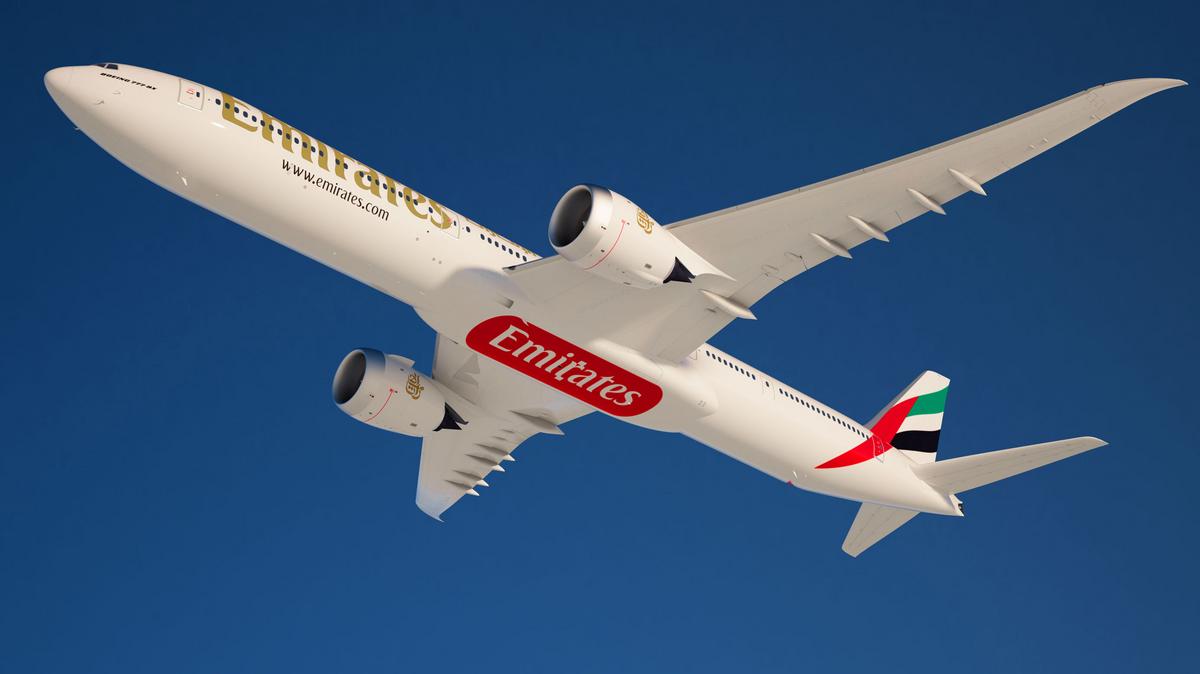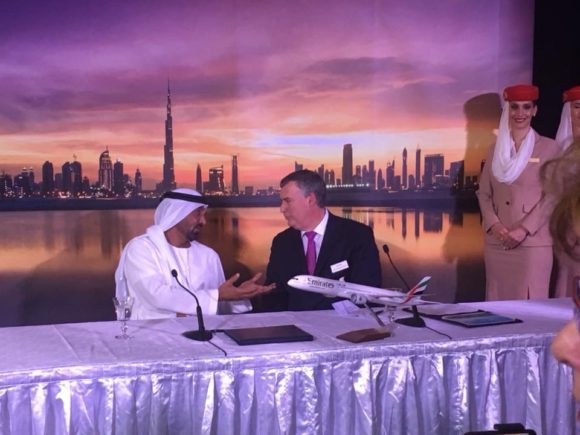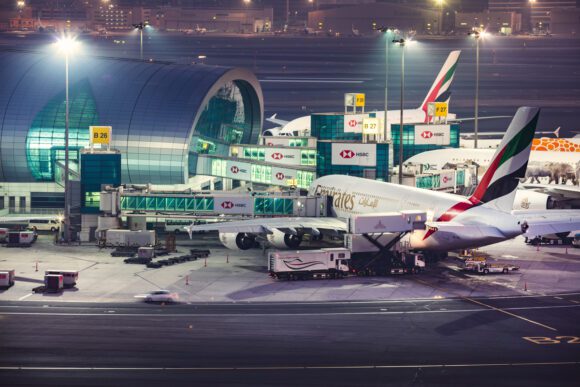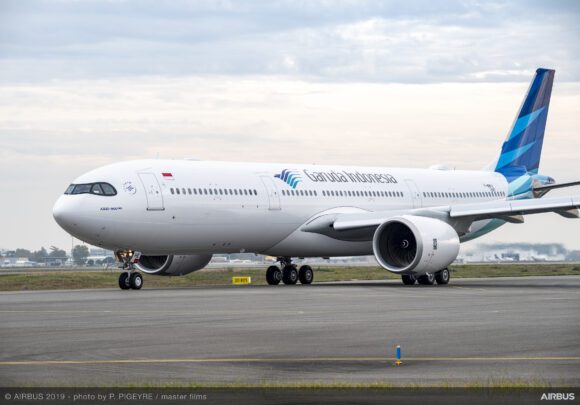
emirates boeing 777x 1200xx2770 1558 0 496
Emirates is unwilling to commit to taking delivery of any new types from Boeing and Airbus unless the engine manufacturers Rolls-Royce and General Electric get their act together and deliver reliable products. The airline’s President Sir Tim Clark used harsh words during a roundtable in London on September 4 with selected media to which Airinsight was invited.
His critical remarks follow a series of ongoing issues with engines from both power-houses.
General Electric discovered blade issues some time ago during ground testing of the all-new GE9X that powers the Boeing 777X. As it wants to prevent any in-service reliability problems at any costs, GE has been doing a redesign. However, that has taken longer to be completed and certified and caused Boeing to announce recently that the 777-9’s first flight has been delayed until early 2020.
With 115 777-9s and 35 -8s on order since November 2013 the delay is something Clark is not happy with: “First flight should have been by October last year and in June we were told it won’t be flying until Q1 next year. That, of course, affects deliveries to us. We were due to receive the first aircraft in June next year, we had 6 or 9 coming on delivery after that but all is now set back. Let’s assume that Boeing has a 13-16 months certification-program, that means we can’t be sure when we will get these airplanes. We are keen to get them, but they should be reliable.”
Sheikh Ahmed and Boeing’s Kevin McAllister sign agreement for 40 Boeing 787-10s at the 2017 Dubai Airshow. (Richard Schuurman)
Then there is Rolls-Royce. The Derby-based company has been consumed by high-pressure compressor blade issues on the Trent 1000 and 1000 TEN that power the Boeing 787. While Emirates still has to confirm its engine choice, the Trent 1000 TEN is a likely candidate for the 40 787-10s that Emirates ordered at the 2017 Dubai Airshow and which Clark says Emirates is still committed to (“We have a possible contract”).
Clark wants assurances on the Trent 1000 as well as on the Trent 7000 that are on the 40 A330-900s and the Trent XWBs on the 30 A350-900s that were announced last February as part of the A380 order revision, but the twinjets still need confirmation in Airbus’ order book. Even the Trent 900 that powers 22 of Emirates current 112 Airbus A380s is in Clark’s fire line as they have HPC-blade and performance issues.
“There is no stability in the Rolls-Royce program at the moment as we see it. Until such time we have definitive guarantees that if we power our aircraft with their engines that will be fit-for-purpose from day one without any restrictions, we are not prepared to make those commitments at this stage”, says Clark. “I am a little bit irritated that over the years we as an airline and I think the industry has been subjected to the requirements of engine manufacturers and take whatever consequences when they don’t work. We are not in a business where aircraft don’t function properly. I need a 99.5 percent dispatch reliability to make it work”.
There is an extra reason why Clark wants extra guarantees on operational reliability: “Particularly in the last ten years, the levels of consumer protection has changed drastically, starting in Europe and has recently seen the introduction of draconian rules in Canada. If we delay a flight 3 to 4 hours we are subjected to ferocious financial penalties if they are caused by a technical issue of our aircraft. On the basis that we buy new aircraft that work all the time in their first 5 to 6 years, we theoretically mitigate the risk of liabilities. But then OEMs must give us aircraft and engines that work from Day one without any restrictions whatsoever.”
Clark continues: “If they can’t give us that, don’t produce them! We will take the aircraft when we are satisfied that the airframers and propulsion companies are confident in their product. We are in certain cases in unchartered territory with these very large new engines on the 777X, but we need to be absolutely sure that when the aircraft is subjected to the flight program that the rigors of stress imposed on the engine in the condition that we will face are post-mastered. The (GE9X) engine will get sorted, but the question is when”.
A330neo/A350-deal needs confirmation
On the delay of the confirmation of the A330neo/A350-deal, Clark says: “We were ready and willing to complete that contract months ago, back in the early part of this year. But we have the same concerns Rolls-Royce isn’t in the position to give us engines that are fit. If we were prepared to take aircraft that needed checks every 300 cycles, change the engine and other things like that, we would have signed to this and taken our chances. But we are too big for that now: 268 aircraft with a brand that relies on to deliver to our customers what we are saying to them we will. I can’t afford to have aircraft that are coming in and out of the fleet because engines have to be changed, no matter what they (the engine makers) throw at you in financial compensation. We are interested in doing our job. So that has changed: we will only take aircraft that will work on this basis”.
That includes the A350, which Airbus is giving high rates on reliability. Clark indicates he has other information on the Trent XWBs: Have you spoken to Derby? I have and I am concerned about reliability, about getting an engine that on entry of service with us does a to have a minimum requirement of cycles and shop visits”.
Airinsight asked Clark on September 5 to be more specific on the XWB. “Do you remember the recent Norwegian 787-incident in Rome? Yes, that’s not an XWB, but it looks like another serious Trent-problem. Right now Rolls is unable to give us an engine that we can use for even 4.000 cycles without checks or repairs. That’s not acceptable to us”.
Discussing the 777X, Clark said it is ‘unclear’ what the situation is of the 777-8. “In the media, I hear it that they have pushed the airplane out. But why doesn’t someone tell me this? After all, I have a contract that says that in January 2022 my first 777-8 arrives. This smoke and mirrors-approach to it I am fed up with”.
First A380s to be retired
Sir Tim Clark also confirmed that Emirates is in the process of retiring the first two A380s from service. He didn’t specify which aircraft, only saying they are coming out of their (finance) lease contracts or are up for costly landing gear-replacements that the airline wants to avoid. “These are being dealt with on a tail-by-tail and month-by-month basis in a retirement plan that is well-planned already. You’re seeing A380s coming out of our fleet for various reasons, but don’t forget this aircraft will still be flying in 2035.” Emirates currently has three double-deckers in temporary storage at Dubai World Central, but three of them are younger than ten years old.
The A380 that two weeks ago fell on its nose during a check-in Dubai (A6-EOP) is being assessed for repair and will be fixed before returning to service. With 11 A380s to be delivered until mid-2021, Clark says the fleet will grow to a maximum of 115 before leveling off to 90-100. In November the first A380 will get the nee Premium Economy-product, but the type won’t get the fully enclosed First Class seats that were introduced on the 777 late 2017.
On the financial side, Emirates has had a better HY1 that it was expecting to have. The trade tensions, economic uncertainties, geopolitical instabilities, as well as the closure of the southern runway at Dubai International in April all had their impact, but bookings for HY2 are looking good. The airline’s cash position has improved as well. “If the fuel price goes further South, we will have a good year”.
Views: 2





